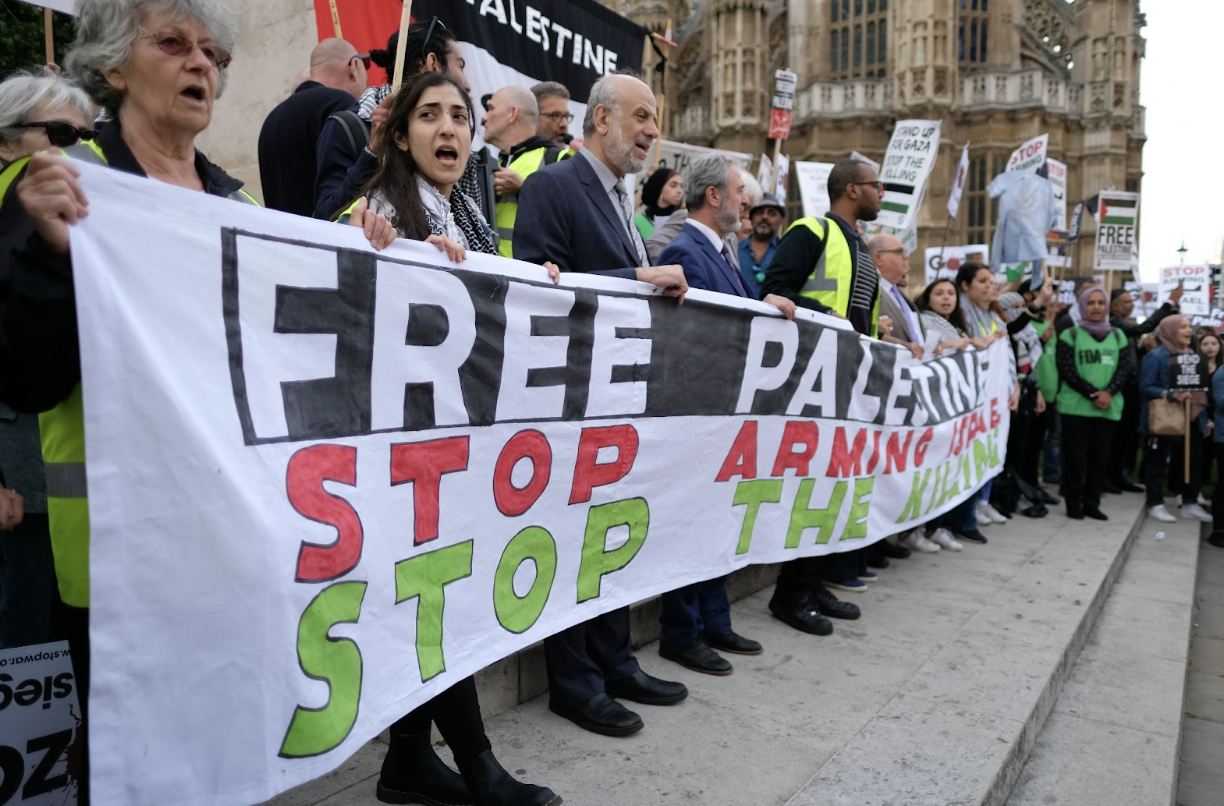How Israel’s war on Gaza has impacted the legal and political landscape in the UK

Salsabeel Yasir, BA International Relations and History
It has been over 24 months since Israel began its genocidal war in Gaza. Over 67,000 Palestinians have been killed and 169,679 injured, although estimates suggest that the actual death toll is higher. The impact of this devastation has extended far beyond the region, reshaping political and legal landscapes across the West, particularly in the UK.
Since 2023, the UK government has sought to criminalise pro-Palestine protests through existing legal mechanisms such as the Public Order Act 2023. The Act expanded police powers, lowering the threshold for intervention and introducing new restrictions on protest activity. Over the past two years, these powers have disproportionately targeted pro-Palestine demonstrators. Under the Act, the Metropolitan Police used suspicionless stop-and-search powers 47 times, 40 of those instances targeted pro-Palestine protestors during a July 2024 national demonstration.
Within the Labour Party, expressions of solidarity with Gaza have deepened divisions and often led to disciplinary measures. Several Members of Parliament (MPs) and councillors have been suspended or have resigned over their stance on Israel’s war. In October 2023, Middlesbrough MP Andy McDonald was suspended after giving what he described as ‘a heartfelt plea for an end to the killings’ during a pro-Palestine demonstration. Similarly, in January 2024, Edmonton MP Kate Osamor faced suspension for referring to Israel’s war as a genocide in an online post commemorating the Holocaust.
UK foreign policy also influenced the result of the 2025 general election, which saw a significant rise in the number of independent candidates challenging Labour’s safe seats. This shift reflected the widespread public anger and frustration with Keir Starmer’s stance on Gaza and support for Israel. The activist group ‘The Muslim Vote’ mobilised voters in constituencies with large Muslim populations, specifically targeting Labour strongholds. Of the six successful independent candidates, five campaigned primarily on their opposition to Labour's position on the genocide. Independent candidate Shokat Adam won a former Labour stronghold, previously held by Jonathan Ashworth since 2011, while Leanne Mohamed posed a significant threat to Wes Streeting, who was re-elected with a narrow majority of 528. This once again underlines the profound domestic impact of Israel’s war on Gaza.
The UK government has also intensified surveillance of school children and teachers expressing pro-Palestine views. Organisations such as CAGE, Amnesty International, and the National Education Union have raised concerns that the Prevent counter-terrorism programme is being used to monitor and penalise such expressions. A 2023 report by CAGE documented a 455% rise in cases involving crackdowns on displays of solidarity, including referrals for wearing Palestinian flag badges, attending demonstrations, or posting support on social media.
Similar patterns have emerged in higher education. A 2025 joint investigation by Sky News and Liberty Investigates found that at least nine British universities received briefings on student protests from private intelligence firms, such as Horus Security Ltd and Mitie Intelligence Hub. 36 universities were found to have exchanged information with police about campus demonstrations, with some sharing event flyers, social media posts, and even the political leanings of guest speakers. Nearly one in four institutions initiated disciplinary proceedings against staff and students involved in pro-Palestine activism. The findings drew sharp criticism from Gina Romero, the UN Special Rapporteur on the freedom of peaceful assembly, who described the situation as ‘deeply disturbing’.
Israel’s genocide in Gaza has exposed the double standards at the heart of Britain’s so-called commitment to ‘free speech’, a right that appears to apply selectively, protecting some voices while silencing others. The surveillance of activists, students, and teachers is reminiscent of the post-9/11 War on Terror climate. Yet, despite these efforts to stifle dissent, the British public has shown an unwillingness to remain silent. From the streets to university campuses, people continue to challenge their government’s complicity in this genocide.



